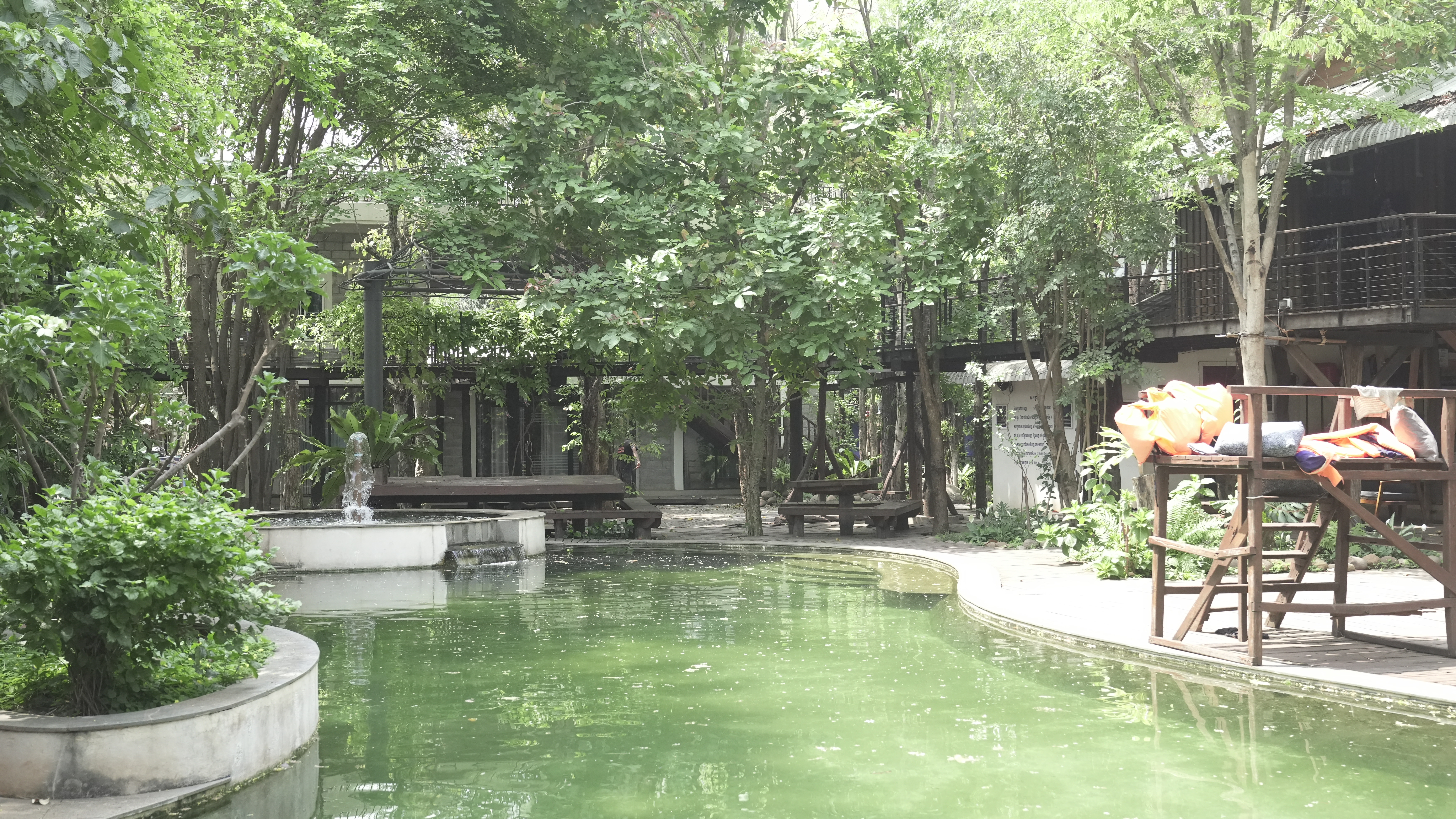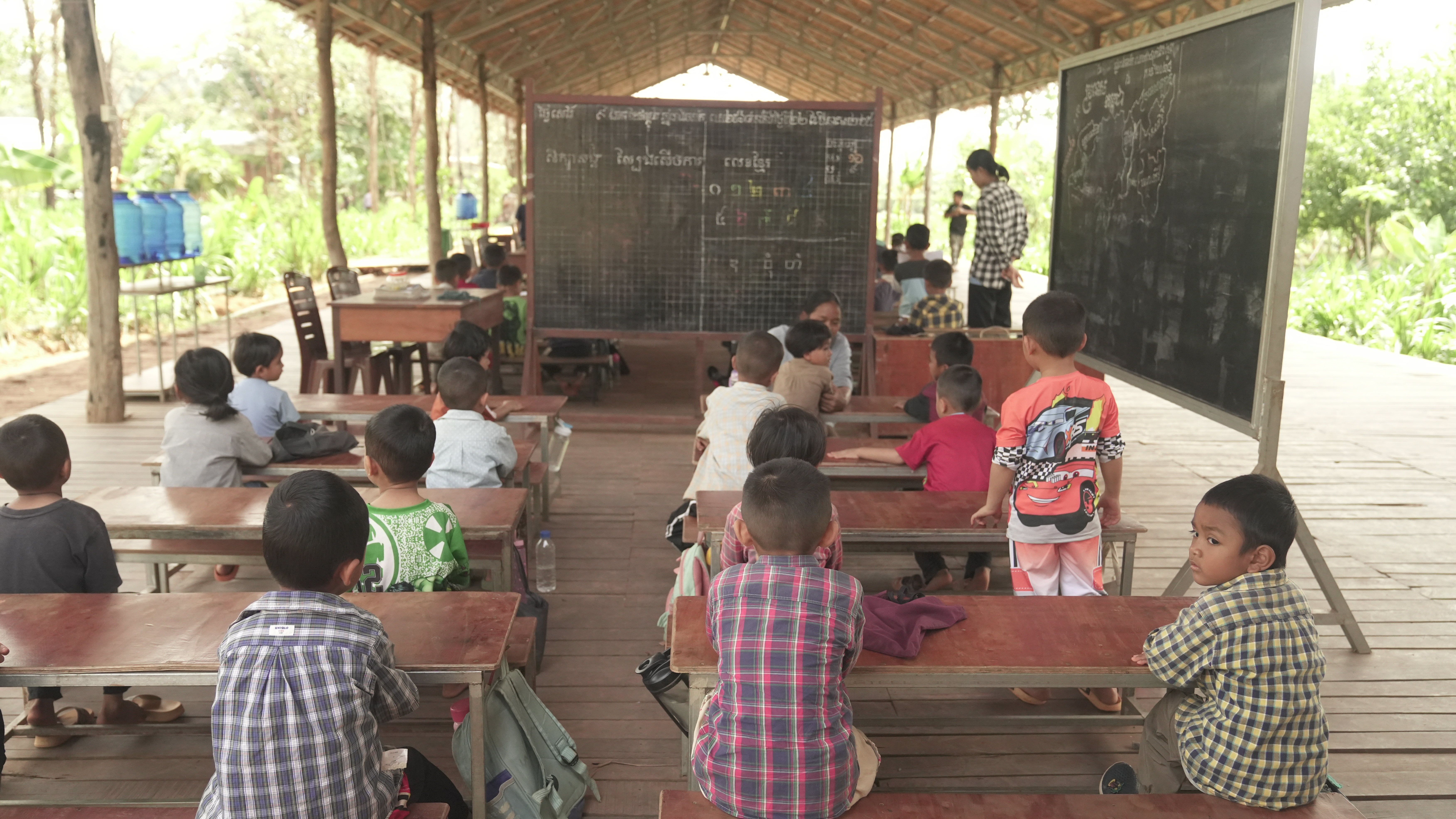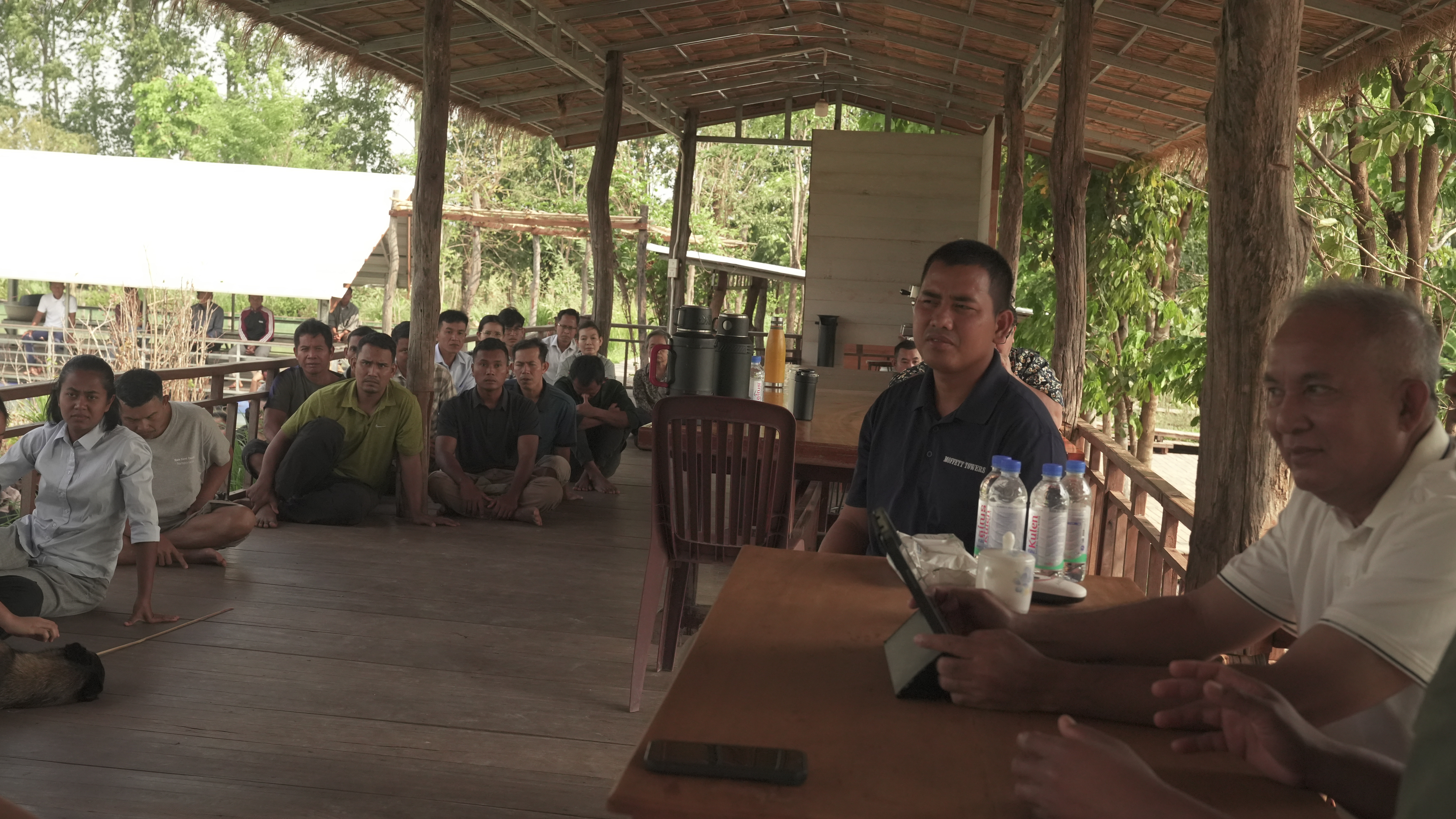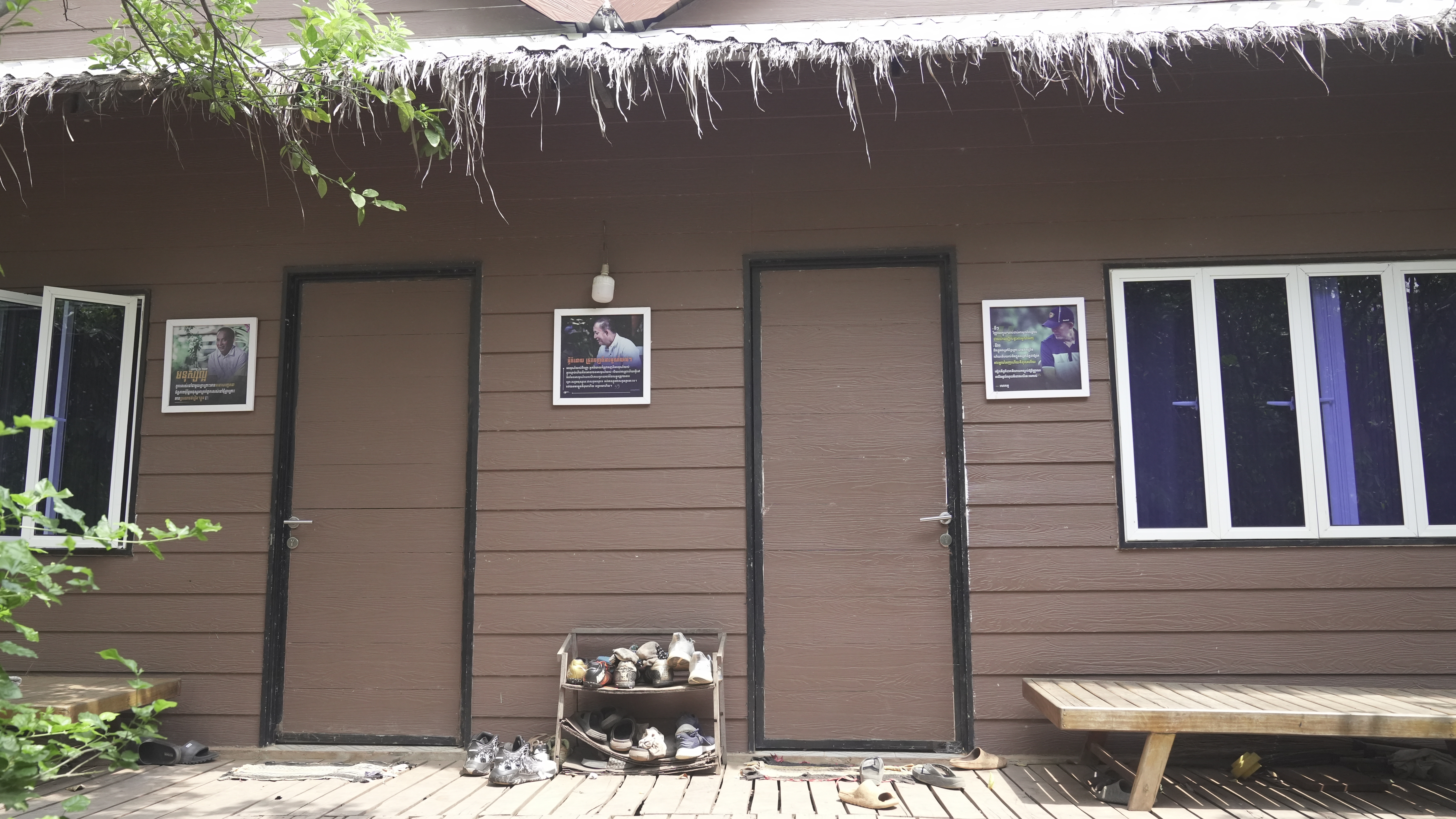Not far from the tourist city of Siem Reap in northwestern Cambodia, roughly a thousand devotees gather around a picturesque pond. They are there to listen to the words of their guru, Khem Veasna, whom they believe has descended from the realm of Brahma in human form. His mission: to teach them the true way of Buddha and save them from the coming apocalypse. These disciples have abandoned their former lives, journeying from as far as South Korea, the United States, and Canada, drawn by the promise of a new beginning in the shadow of Cambodia’s sacred Mount Kulen.
Over the past few years, Veasna’s followers have dedicated themselves to building a sustainable, egalitarian community. It is a place of tranquility, where children can play freely without fear of crime, where money is obsolete, and vices like alcohol and gambling are relics of the past. Images of their spiritual leader adorn nearly every wall, and followers credit him with supernatural insights.
“He knows why Israel is fighting Palestine. He knows why Russia invaded Ukraine. He knows why the Earth rotates,” says Net, one of Veasna’s followers. “He is a representative of the Buddha.” Another adds, “He can read your mind.”
While charismatic leaders starting isolated spiritual movements are nothing new, Khem Veasna is more than just a guru, and this is no ordinary spiritual gathering. Veasna’s followers refer to themselves as members of the League for Democracy Party (LDP), which won five percent of the national vote in the 2018 Cambodian general election, placing third out of 20 competing parties. Veasna is one of the most outspoken and well-known critics of the current government, reaching tens of thousands of listeners through online speeches broadcast freely within the country.
Community members insist that they have not transformed from a political party into a religion. Rather, they told The Diplomat, Veasna has consistently pursued the same goal, adapting his methods to effectively convey his teachings. “I took political party members and turned them into real humans,” Khem Veasna said in a rare interview at his compound, which was conducted in front of an assembly of followers. “It is the same movement.”
He said that though the LDP was still active, he had ceased political activities to focus on raising consciousness in light of the impending magnetic pole shift, which he says will occur in the next four months.
“Everybody will be lost,” Veasna said, teaching that the hottest parts of the world will become the coldest and vice versa, and that like an airplane that loses GPS, humans will lose their ability to function.
“They are already lost now,” he clarified. “They are thinking about making money.”

A tranquil living area in the center of Khem Veasna’s commune, March 22, 2024. (Photo by Vutha Srey)
Veasna believes that those who will be spared are those who make a connection with their “Viññāṇa” a Pali word that roughly translates to “awareness,” as opposed to focusing on their physical comfort. He teaches that only by following him can people find themselves.
“You can clearly see that I am different from all other people in the world,” he told The Diplomat. “I always explain things logically, and my heart is kind and selfless, which is the heart of Buddha. This shows that I am the one who came to re-explain Buddha’s enlightenment about nature.”
The LDP was founded by Khem Veasna in 2005 as a political movement advocating for radical transparency and moral governance in Cambodia. Over the years, it gained a small but dedicated following. It won just over 1 percent of the vote at the national elections in 2008 and 2013, before coming third in the 2018 general election with around 5 percent of the national vote. Veasna’s speeches, blending political critique with spiritual philosophy, attracted tens of thousands of online listeners, many of whom saw him as more than just a politician. In 2022, he declared that a catastrophic global disaster was imminent and urged his followers to abandon their previous lives and take refuge on his farm near Mount Kulen. Up to 20,000 followers heeded the call, but when the apocalypse failed to materialize, most of them left. (The party did not take part in the 2023 national election).
Da Lin, a 33-year-old woman, was one of the 1,000 or so who stayed. She said that she moved to the United States in high school, before going to university in Canada, where she lived for 18 years. She and her husband joined the LDP when Khem Veasna visited Canada to raise support for the Cambodian opposition. His “eight mechanisms,” a plan to reduce corruption in Cambodia by limiting the power of the prime minister, appealed to her and her husband, who began tuning into his regular online broadcasts. When he called his followers to join him, they left their jobs, pulled their kids out of school, and came.
“It’s hard to pick one thing,” she said about what motivated her to make such a big decision. But she was clear that she felt it was a great decision. She smiled serenely at reporters as behind her, her son was receiving a lesson in the community school.

Students take part in a lesson at the community’s school, March 22, 2024. (Photo by Vutha Srey)
The community – members refer to it merely as “The Farm” – is an undeniably peaceful place. Clean, happy dogs and children dart between people’s legs. The walkways and living areas are immaculately clean, and the communal kitchens are full of produce made on the farm and purchased outside. Community members often get around using small electric vehicles that zip past the buildings.
After the success of the first commune, they are hard at work building a second one a few hundred meters away. At the moment, the living conditions in the second commune are noticeably lower than in the first, but this is likely because construction is still ongoing. However, when reporters visited on a Saturday, children in the first community were attending school, while children in the second community were working in the fields.
Maintaining such a peaceful sanctuary requires a demanding schedule. Every day, members – including children – work in the fields, kitchens, and other facilities. But approximately twice daily, Veasna sits before multiple cameras to stream an hour-long sermon covering topics from inner peace to politics and the impending end of the world. When this occurs, the majority of the community pauses their activities to listen intently. Even after he finishes speaking, recordings of his words echo throughout the community.
Usually, his talks are a mix of apocalyptic Buddhism, pseudoscience, and political commentary, always with a religious or spiritual slant.
He explained to The Diplomat that Khmer Buddhists are not really following the teachings of Buddha, and that out of Cambodia’s population of 17 million, only about 10,000 or 20,000 follow him. Only those who truly understand his concept of “Katas” (which translates roughly as “the root reason of all things”) will be saved when most of the world is destroyed by the magnetic pole shift that will happen before the end of August 2025. Those who are true understanders, but not currently on his farm at the base of Mount Kulen, will be transported through time and space and appear there when the apocalypse comes.
He told The Diplomat, “You don’t have much time.”

Khem Veasna (at far right) talks to journalists in front of an assembly of his followers, March 22, 2024. (Photo by Vutha Srey)
However, although hundreds of complaints have been made to the police about Khem Veasna’s community, and the fact that the police announced they had seen evidence of child labor at its compound, the community has been allowed to continue its activities. This level of tolerance is noteworthy in a country where other, significantly smaller opposition political movements have been subject to fierce political crackdowns. In 2022, Hun Sen, Cambodia’s then prime minister, denied any collaboration with the group and said that he did not forcibly disperse it only because he wanted to avoid bloodshed.
One farmer living near the farm, who requested not to be named, said that the LDP had taken land from nearby landowners, and that one person had even been beaten when he approached the community to talk to them about it. He said that the police had not intervened to stop these land grabs from happening.
“We have lived here for generations,” he said. “They came and took land that belonged to us.”
Another neighbor said that she often saw LDP members at the local market, and that her interactions with them were courteous and normal. But she did point out that the LDP compound has a gate and a guard, and said, “They can visit us whenever they want. We can’t visit them.”
Khem Veasna acknowledged to The Diplomat that there is an ongoing court dispute with one of his properties, but said, “This problem is not a big deal to me because I know that the world will face a disaster soon.”
In response to this, his neighbor replied: “If I have my rice and my land, I will not die.”
On the other hand, the police do maintain a presence near the compound and try to dissuade more people from joining the community.
Khem Veasna told The Diplomat via Facebook Messenger that the police “are afraid that we are spreading political propaganda. They don’t understand me, what I am doing, what I am explaining to people, that’s why they don’t listen to my logical explanations. They don’t know me as the one who came to enlighten the Buddha’s words.”

The entrance to a typical house on the commune, as seen on March 22, 2025. Portraits of Khem Veasna adorn the walls, as in many other parts of the community. (Photo by Vutha Srey)
The switch from a standard political party to an apocalyptic commune may seem strange, but may not be that surprising in a Cambodian, or Southeast Asian, context. Erik Davis, a professor of religious studies at Macalester University who focuses on collective and ritual creativity associated with social protest movements in urban Cambodia, said: “The political party step may be new, but the connection between religious practice and political power is old.”
He explained that in the 9th century, Jayavarman VII, the king of the Angkorian Empire, had his own face carved onto statues of the Buddha inside temples, and institutionalized the link between Buddhist merit and political legitimacy. He and later kings came to be known as the “devarajas,” or God-kings. Later, Cambodian leaders sought to align themselves with Buddhist teachings, and large political events were often interpreted through lessons even into the modern era. The Khmer Rouge genocide of the mid-1970s, for example, was seen as having been foretold by the Putth Tomneay, a Cambodian Buddhist set of prophecies. This association was harnessed by Prince Norodom Sihanouk, who led Cambodia during the late 1950s and 1960s, when he sought to associate himself with the prophesized emergence of a neak mean bon (meritorious person) who would vanquish evil and bring prosperity to the country.
According to research by Astrid Norén-Nilsson, the director of studies at the Centre for East and South-East Asian Studies at Lund University, Hun Sen the erstwhile prime minister, sought to portray himself as the reincarnation of Sdech Korn, a righteous 15th century temple servant who overthrew a corrupt king and led the Khmers into prosperity. Not only did Hun Sen make comparisons between his star sign and upbringing and those of Sdech Korn, but during the later years of his rule, many statues of the historical king were erected, which bore a striking resemblance to the Cambodian leader.
In light of the history of politicized religion in Cambodia, Davis says that Khem Veasna’s movement strikes him as distinctly Cambodian in spirit, as it “has always existed as a set of tropes that are common throughout Cambodian society.” He said that “there have always been attempts to synthesize these ideas into one project.”
As one follower, Net, explained to reporters in the compound: “If you want to understand Uncle Veasna you must, I say must, learn Khmer.”
He added, “Only in Khmer, only in Cambodia, and only Uncle Veasna.”

































